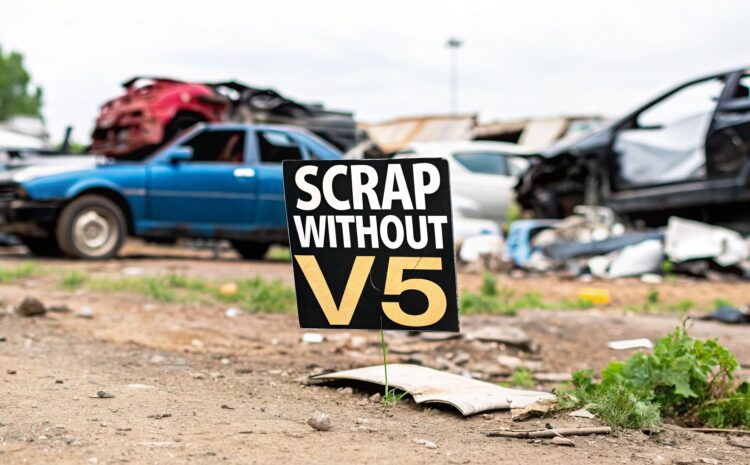
Scrapping a Car Without V5: Easy UK Guide
Right, let's get one thing clear straight away: yes, you absolutely can scrap your car in the UK without a V5C logbook. It’s a common headache, but there’s a proper, official way to sort it out. While having the V5C on hand definitely smooths things over, not having it isn't a dead end.
How the Legal Scrapping Process Works
Losing your V5C can feel like a showstopper, but trust me, licensed scrapyards see this all the time. The crucial thing to remember is that the V5C is a registration document, not your only proof of ownership. The system has built-in workarounds for when the logbook goes missing, as long as you can prove the car is yours in other ways.
The whole process hinges on one non-negotiable step: you must use an Authorised Treatment Facility (ATF). These are the only places in the UK legally allowed to scrap vehicles. They know exactly how to handle ownership verification without a logbook and are the DVLA's trusted partners for getting it done right.
The Role of an Authorised Treatment Facility
Think of an ATF as the official go-between for you and the DVLA. When you show up without a V5C, they'll take charge of a few extra steps:
- Checking your ID: They'll need to see some photo ID, like your driving licence or passport, to confirm you are who you say you are.
- Confirming ownership: You'll need to provide some other form of proof. A recent utility bill matching the car's registered address, a sales receipt, or an insurance certificate usually does the trick.
- Issuing a Certificate of Destruction (CoD): This is the golden ticket. The CoD is the official proof that your car has been taken off the road for good and you're no longer responsible for it.
This official process ensures that even without the logbook, your legal ties to the car are completely and correctly severed. Scrapping a car without the V5C is perfectly legal, it just means a few extra hoops to jump through for verification, and you must use an ATF. You can get more details on scrapping a car without its logbook to see what to expect.
The Bottom Line: Don't panic if your V5C is missing. The responsibility simply falls on you to prove ownership with other documents and to make sure you're dealing with a government-approved Authorised Treatment Facility. This is your safeguard against any future fines or legal issues tied to that vehicle.
Proving Ownership When You Can't Find the V5C Logbook
So, you’ve lost the V5C logbook. Don't panic. It's your top priority to prove you're the car's rightful owner, but it's absolutely possible to do so without that specific document.
Any reputable Authorised Treatment Facility (ATF) won't touch a car unless they're 100% certain you have the legal right to scrap it. Think of the V5C as the car's main ID, like a passport. If it's gone, you just need to use other official paperwork to build a convincing case that the car belongs to you. Getting these documents ready before you even pick up the phone to a scrapyard will make everything go much more smoothly.
The Paperwork That Works Instead
What you need is a solid combination of personal ID and documents that connect you to the car itself or the address where it's registered. Any legitimate scrapyard will need to see your photo ID – a passport or driving licence is perfect – along with at least one, preferably two, of the following:
- A Solid Bill of Sale: This is brilliant evidence, especially if you bought the car from a dealership. A proper receipt on headed paper, showing the car's registration, make, and model alongside your name and address, is hard to argue with.
- Your Car Insurance Certificate: Your current insurance policy is a powerful piece of proof. It directly ties your name to that specific vehicle as the policyholder.
- A Recent Utility Bill or Bank Statement: This is all about proving your address. Make sure the document is recent (dated within the last three months) and that the address on it matches the one the vehicle is registered to.
- MOT Certificate: A valid MOT certificate is another official document that links you to the car's registration number, adding weight to your claim.
A Pro Tip From Experience: Don't just show up with one piece of paper. I always recommend having a small folder ready with your photo ID and a couple of options from the list above. It shows you’re prepared and leaves no room for doubt, which helps speed up the entire process on the day.
What to Do If You Have No Paperwork at All
Okay, what if it's the worst-case scenario and you have absolutely nothing linking you to the vehicle? In this rare situation, trying to scrap the car is a non-starter. Your only real option is to apply for a replacement V5C directly from the DVLA.
You can apply for a new logbook either online or through the post. The DVLA website has all the details and walks you through the steps.
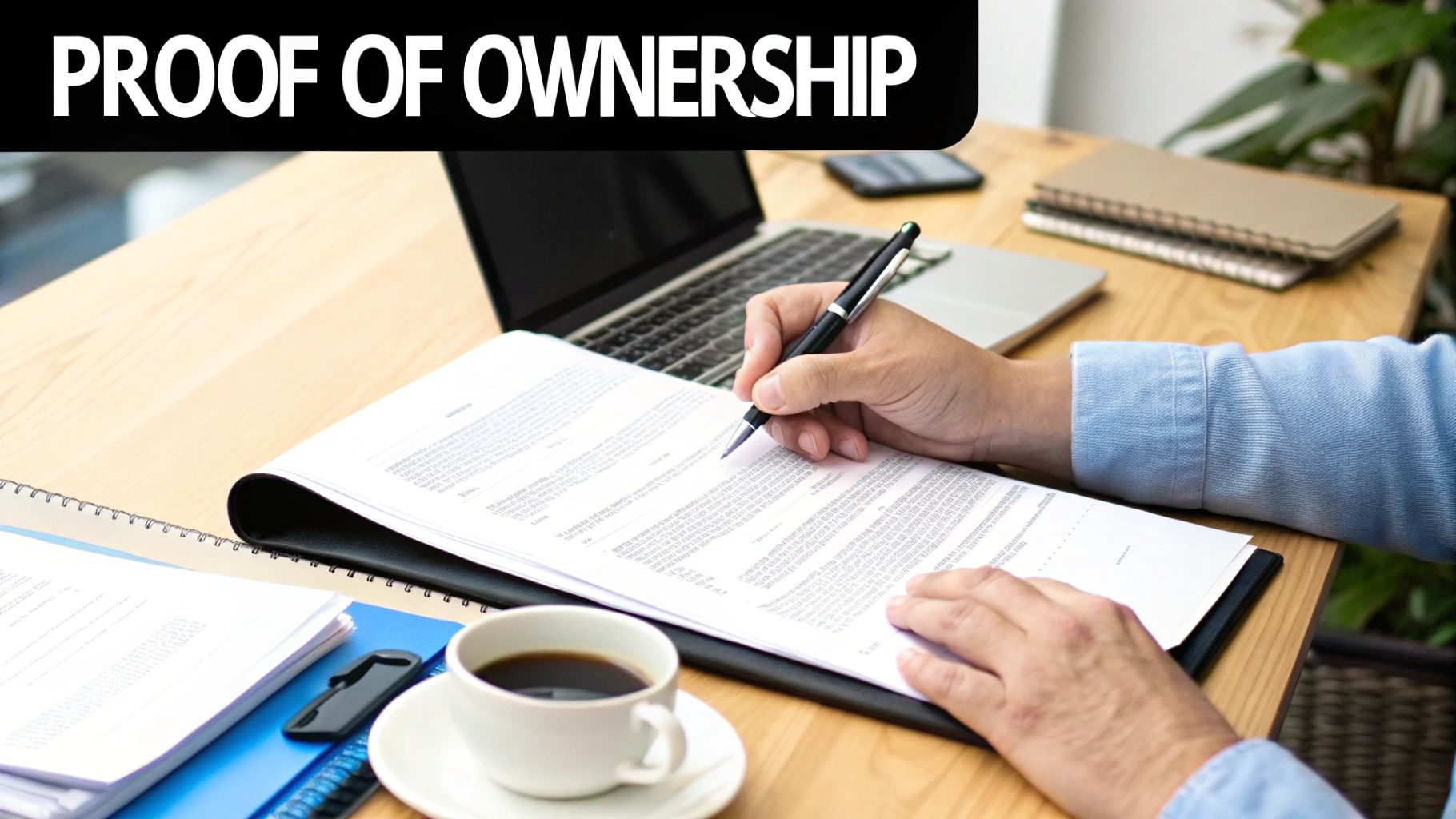
The image above is a snapshot of the official government page where you can kick off the process. Be aware that it comes with a £25 fee, and you should expect to wait up to five days for the new V5C to arrive by post. You'll need to build that delay into your timeline.
Having the correct V5C in your name is also vital if the car has a complicated history, like being a previous write-off. For example, anyone looking into how to remove a Cat N status from a car will find that having the logbook is an essential first step in that journey.
How to Properly Notify the DVLA After Scrapping
Once your old car is loaded up and taken away by the Authorised Treatment Facility (ATF), you might breathe a sigh of relief. But hold on—the job isn’t quite done yet. Your final, and arguably most important, task is to formally notify the DVLA that your vehicle has been scrapped. This is absolutely non-negotiable, especially when you've scrapped the car without its V5C logbook.
If you skip this step, the DVLA's records will still show you as the registered keeper. That’s a risky position to be in. It means you’re legally on the hook for any future road tax, parking fines, or even criminal activity linked to that car. It's a simple piece of admin that gives you total legal protection.
Your Legal Duty to Inform the DVLA
Without the V5C logbook, you can't just tear off a section and pop it in the post. Instead, you need to contact the DVLA in writing. This creates a formal paper trail proving you’ve transferred the vehicle to a scrapyard, which is a critical legal safeguard.
To put it plainly, failing to notify them means the car is officially still yours. You’ll remain liable for any fines or tax demands that might crop up. Your letter needs to provide key details: the car’s registration, make, and model, the date it was scrapped, and which ATF handled it.
This image lays out the key documents you'll need to scrap your car and get that all-important Certificate of Destruction.
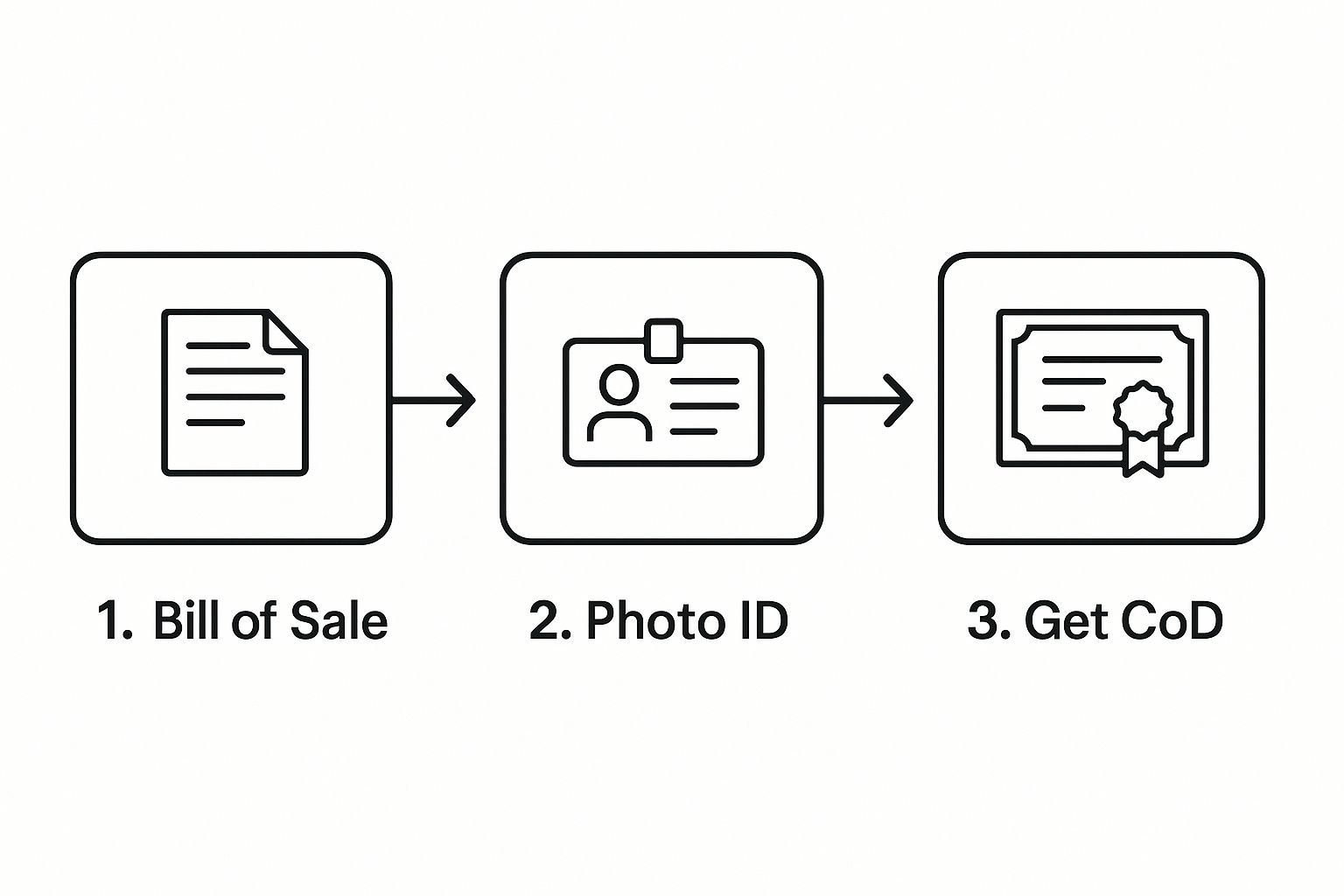
As you can see, having proof of ownership like a bill of sale, alongside your photo ID, is the first step towards getting your hands on that official Certificate of Destruction.
Writing the Perfect Letter to the DVLA
Your letter to the DVLA doesn't need to be complicated, but it does need to be clear and contain all the right information. Think of it as your final, official statement cutting ties with the vehicle.
Here’s exactly what to include:
- Your Personal Details: Your full name and the address where the car was registered.
- The Car's Details: Its registration number (number plate), make, and model.
- The Date: The exact date the ATF collected the vehicle from you.
- The Scrapyard's Details: The full name and address of the Authorised Treatment Facility.
A Simple Letter Template to Get It Right
To make this foolproof, here’s a basic template you can follow.
[Your Name]
[Your Address]
[Your Postcode]
[Date]DVLA
Swansea
SA99 1BDSubject: Notification of Vehicle Scrappage – [Your Car's Registration Number]
Dear Sir/Madam,
I am writing to confirm that I have sold my vehicle for scrap. Please find the details below:
- Vehicle Registration: [e.g., BD51 SMR]
- Make and Model: [e.g., Vauxhall Corsa]
- Date of Sale/Scrapping: [e.g., 20 October 2023]
- Scrapped by (ATF Name): [e.g., Fast Scrap Car Ltd]
- ATF Address: [The ATF’s Full Address]
I would be grateful if you could update your records to show that I am no longer the registered keeper of this vehicle.
Yours faithfully,
[Your Signature]
[Your Printed Name]
Don't forget to get a Certificate of Destruction (CoD) from the ATF. This document is your ultimate proof that the car has been legally and permanently disposed of.
And if your car was previously declared off the road, scrapping it officially ends its SORN status. Our guide on the SORN process can offer more insight into how this all works.
Finding a Legitimate Authorised Treatment Facility
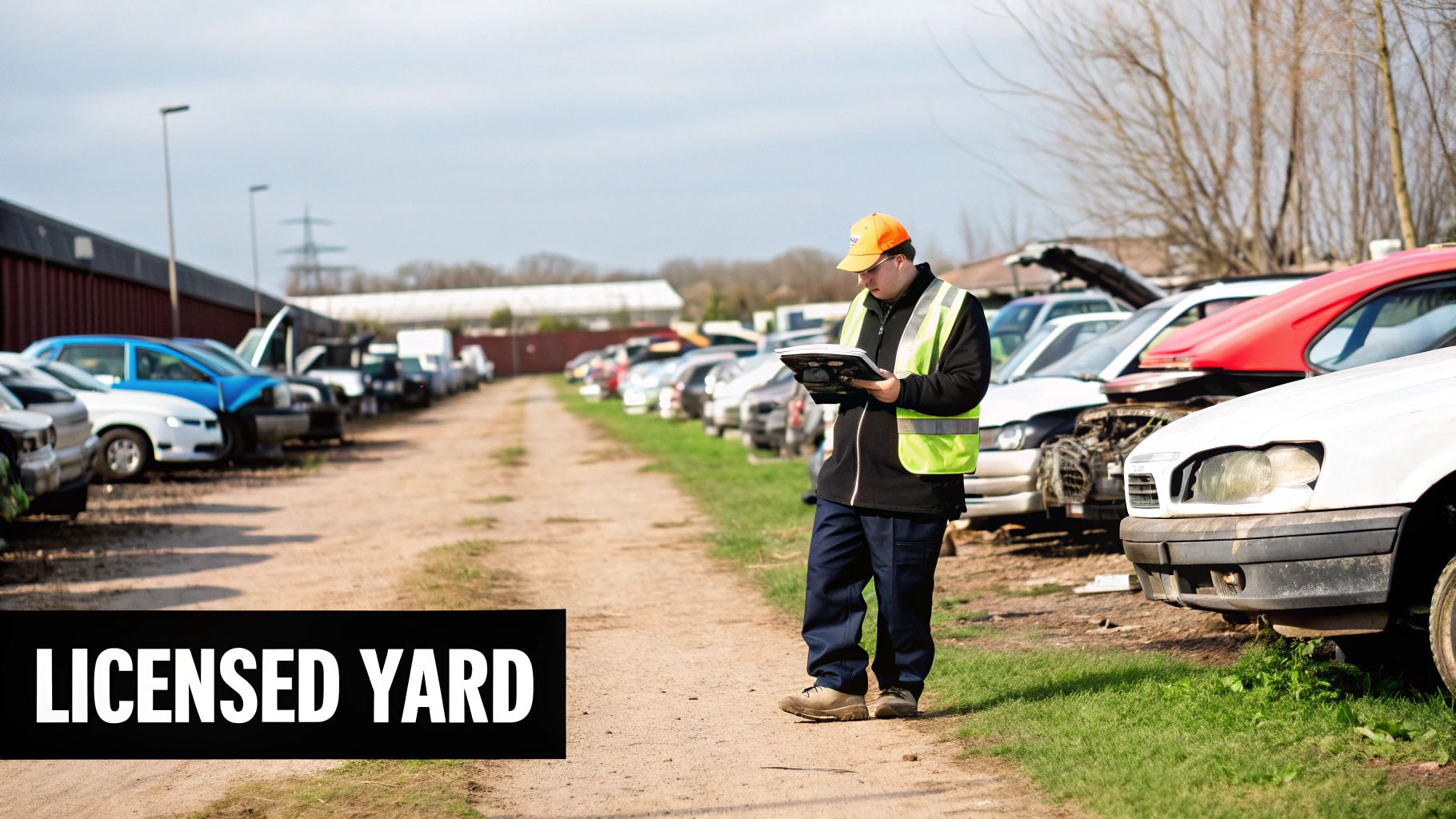
When you're scrapping a car without a V5C, the scrapyard you pick isn't just a minor detail—it's the most critical choice you'll make in the entire process. The law is very clear on this: you can only scrap a vehicle at an Authorised Treatment Facility (ATF). These are the only places that have a licence from the UK's Environment Agency to correctly depollute and recycle end-of-life vehicles (ELVs) according to strict environmental rules.
Sticking with an ATF is your best protection. Think of them as the DVLA's trusted partners on the ground; they know the official drill for verifying ownership, especially when the logbook is missing. If you go with an unlicensed operator, you're not just risking a fine for breaking environmental laws. You could find yourself still legally responsible for a "ghost" car you thought was long gone.
How to Check if a Scrapyard is a Genuine ATF
Thankfully, you don't have to just take a company's word for it. Checking if a scrapyard is a legitimate ATF is simple. The Environment Agency keeps a public register of all licensed facilities.
All you need to do is head over to the official government register and pop in the company’s name or postcode. If they’re not on that list, they have no legal right to scrap your car. My advice? Walk away immediately. Any proper, professional outfit will be more than happy to give you their licence number to make the search even easier.
This quick check is the single best way to filter out the genuine pros from the rogue traders who could land you in serious legal trouble later on.
A key takeaway is that an ATF is not just a scrapyard; it's a regulated facility with legal obligations. Their role is to issue a Certificate of Destruction (CoD), which is the official document that permanently removes your car from the DVLA's database and ends your responsibility for it.
Red Flags That Signal an Unlicensed Operator
From my experience, spotting an illegitimate scrapyard is often about knowing the tell-tale signs. These operators are always looking to cut corners, and their methods can be a dead giveaway. Keep an eye out for these warning signs:
- They Offer Cash Payments: This is the biggest red flag of all. The Scrap Metal Dealers Act of 2013 made it illegal to pay cash for scrap cars anywhere in the UK. A legitimate ATF will always pay you through a traceable method, like a bank transfer or a business cheque.
- They Don't Ask for ID or Proof of Ownership: A reputable ATF will always ask for your photo ID and some proof you own the vehicle, especially if you're scrapping a car without its V5. If they don’t seem bothered about who you are, they aren't following the law.
- They Cannot Guarantee a Certificate of Destruction (CoD): If a scrapyard gets cagey about issuing a CoD, or even suggests you don't really need one, they are not a legitimate ATF. That certificate is your one and only official proof that your car has been properly destroyed.
The whole business of scrapping a car without a logbook becomes much less daunting when you're working with a professional, compliant service. By making sure they're a real ATF and watching for these red flags, you can rest easy knowing everything is being handled legally, ethically, and without any nasty surprises for you down the road.
How Your Car's Scrap Value Is Calculated
One of the first questions people ask when scrapping a car without a V5 is, "Will I get less money for it?" Let's clear that up right away: a missing logbook has absolutely no effect on your car's scrap value. A reputable Authorised Treatment Facility (ATF) couldn't care less about that piece of paper when it comes to the price. They're interested in the car itself.
The quote you get is almost entirely down to one thing: weight. More metal equals more money. It's that simple. This is why a hefty old 4×4 will always be worth significantly more than a little city runaround. At this stage, your car is a commodity, valued for the raw materials like steel, aluminium, and copper that can be pulled out and recycled.
An ATF's offer isn't a starting point for a haggle. They won't try to knock the price down just because you've misplaced the V5C. Their main concern is simply proving you're the legal owner, and as we've covered, there are other ways to do that.
What Really Determines the Final Offer
While weight is the biggest factor by a long shot, a few other things can nudge the price up or down. The specific make and model play a part, mostly because some cars are just heavier or have more valuable bits and pieces than others.
A common car like a Ford Fiesta, for instance, has a pretty standard scrap value because its weight is well-known. On the flip side, a beast of a vehicle like a Land Rover Discovery will fetch a much higher price purely because it's got more tonnage of metal. The condition of certain parts can also add a little bonus to your quote.
- Alloy Wheels: These are worth more than standard steelies, so they can give your offer a slight boost.
- Catalytic Converter: If it's the original one and still attached, the precious metals inside (platinum, palladium, and rhodium) add a surprising amount of value.
- A Complete Car: An engine, gearbox, and all the main components being present makes a difference. A car that’s whole, even if it doesn’t run, is worth more than a stripped-out shell.
Industry data shows that the average car is around 14 years old when it's sent to the scrap heap. It also proves just how much vehicle type matters—a Range Rover Vogue, for example, can command over 201% more than the average scrap value. This just goes to show that weight and model are the real deciders, not paperwork. You can see more vehicle scrapping statistics and discover other insights from this comprehensive report.
To make sure you're getting a fair deal, it's always smart to get quotes from a few different licensed ATFs. It lets you compare what’s on offer and pick the best combination of price and service. Our guide on how to scrap your car efficiently has more tips on getting the most from your old motor. Just remember, what matters is the car's physical substance, not its history on paper.
Your Questions Answered: Scrapping a Car Without a Logbook
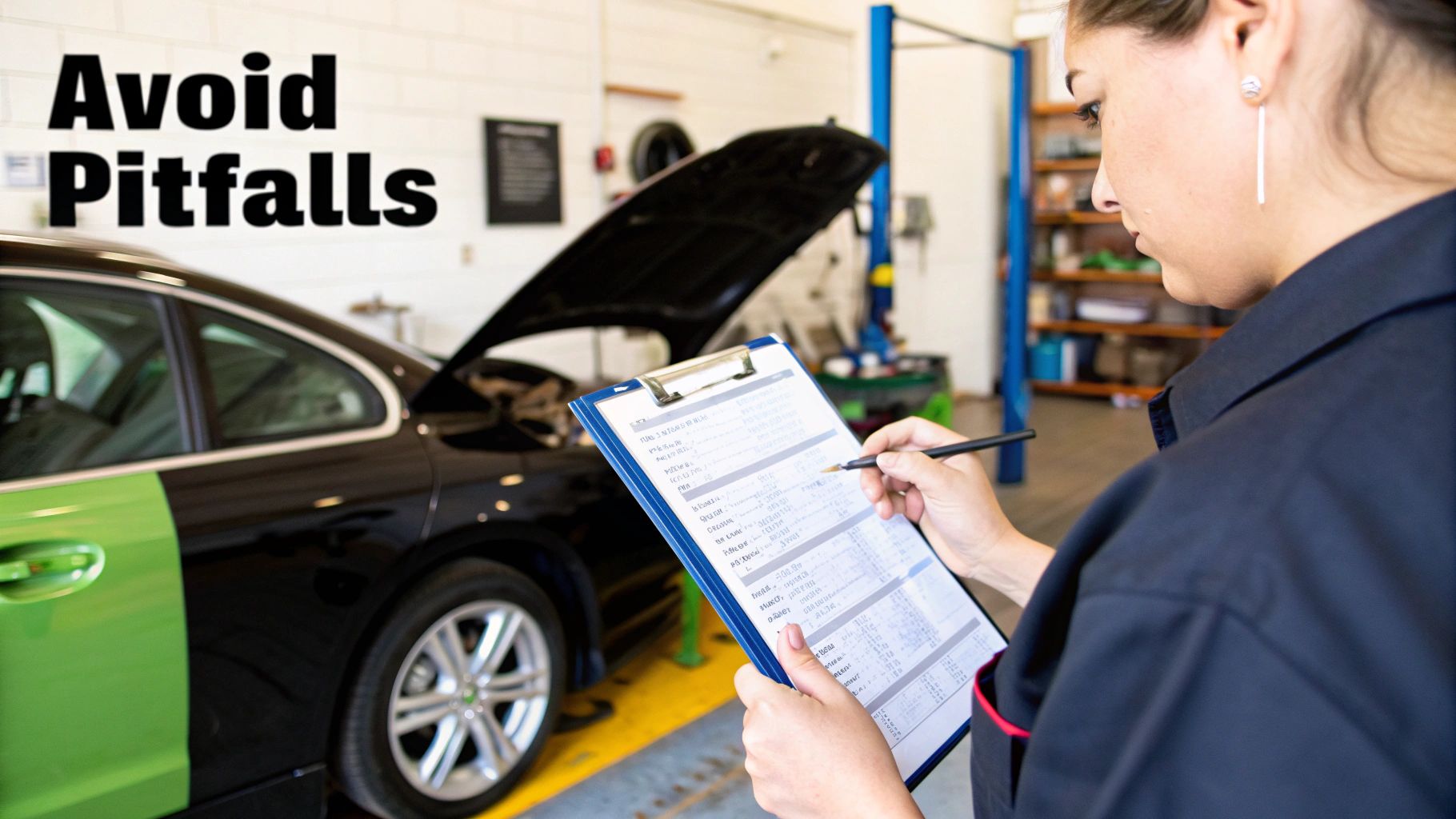
Even when you know the steps, it's natural to have a few nagging questions when you can't find your V5C. We see these queries all the time, so let's clear them up and give you the confidence to get that old car sorted.
One of the biggest worries we hear is, "Will I get less money for my car without the logbook?" The answer is a simple and firm no. Any professional Authorised Treatment Facility (ATF) bases their valuation on the car's weight and reusable parts, not the paperwork. The V5C is purely for legal proof, not for haggling over the price.
Another common what-if: "What happens if I find the V5C after the car has been scrapped?" Don't panic. As soon as you've sent your letter to the DVLA and the scrapyard has issued the Certificate of Destruction (CoD), your legal duties are complete. That old logbook is now officially obsolete, so you can just shred it.
Can I Scrap a Car for Someone Else?
Absolutely. This comes up a lot, especially when helping out a relative. It's perfectly doable, but you need to have the proper authorisation to act on their behalf.
A reputable scrapyard will require you to provide:
- A signed letter from the registered keeper that explicitly gives you permission to scrap the car.
- A copy of the registered keeper’s photo ID.
- Your own photo ID to verify who you are.
Without this paper trail, a licensed ATF simply can't proceed. It's their legal obligation to ensure they are dealing with the rightful owner or someone with the proper authority.
The Bottom Line: When scrapping a car without a V5C, it all comes down to proof. Whether you're proving you own the car or that you have permission to scrap it for someone else, the scrapyard needs to verify everything before they can legally take the vehicle.
What if the Car Isn't Registered in My Name?
This can feel like a tricky situation. Perhaps you bought a car but the seller never sent the V5C, or you never got around to registering it in your name. An ATF can't scrap a vehicle for someone who isn't the registered keeper unless there's clear proof of a recent and legitimate sale.
Your best friend here is a signed and dated bill of sale. This document is crucial. It must show the seller's details, your details, the vehicle information, and the date you bought it. When you present this along with your photo ID, most genuine scrapyards will be able to help. It's always a good idea to call them first and explain the situation, just to confirm their specific requirements.
At Fast Scrap Car, we handle these situations daily and make the entire process hassle-free, V5 or not. We offer instant quotes, free same-day collection throughout London and Surrey, and take care of all the DVLA paperwork for your complete peace of mind. Get your free, no-obligation quote today at https://fastscrapcar.co.uk.
